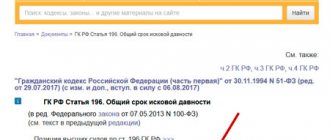Disagreements between an employer and his subordinate are not uncommon and are often resolved peacefully in the course of business. But, if a compromise cannot be reached, both parties can turn to the territorial court to resolve the problem.
Most often, disputes arise on financial grounds: withholding fines, non-payment of wages, sick leave, vacation pay, bonuses. But in many cases, outright violations of contractual relations and illegal dismissal are recorded.
This type of disagreement, where the parties are the employer and the employee, is called an individual labor dispute.
What is a statute of limitations?
From the point of view of civil law, this term defines a certain period during which it is possible to file a claim in court to protect and restore violated rights. In paragraph 1 of Art. 196 of the Civil Code of the Russian Federation, the general limitation period is 3 years from the moment of actual detection of a violation of a citizen’s rights.
Meanwhile, in the Labor Code of the Russian Federation there is no concept of a “limitation period”, but there is a “term for filing a lawsuit”. Both concepts have the same essence, but when it comes to labor relations, it is more correct to talk about the time limit for going to court to resolve an individual labor dispute.
What are the deadlines for applying to a labor court?
According to Art. 391 of the Labor Code of the Russian Federation, claims filed by:
- workers with violated labor rights;
- employees reporting illegal actions of employers;
- employers who suffered damage due to the fault of a subordinate;
- citizens who have received an unlawful refusal to hire;
- citizens working for individuals who are not individual entrepreneurs;
- persons who have been discriminated against.
The statute of limitations for employees is different from the statute of limitations for employers. All of them are spelled out in Art. 392 of the Labor Code of the Russian Federation, which establishes the right to go to court for both parties, as well as the grounds for appeal.
IMPORTANT! In relation to individual labor disputes, the general provisions of civil law do not apply. In this matter, you need to be guided exclusively by the Labor Code of the Russian Federation.
Time limits for filing a lawsuit for an employee
Under Part 1 of Article 92 of the Labor Code of the Russian Federation, employees are provided with the following deadlines and grounds for going to court:
- 3 months from the date of establishment of the fact of violation of the employee’s rights or from the day when the employee should have learned about this violation;
- 1 month from the date of receipt of the work record book or dismissal order for cases of disputes regarding dismissal;
- 1 year from the date on which full cash payment is due for disputes based on non-payment or incomplete payment of wages.
Due to such short deadlines (except for the third point), as well as legal illiteracy, most workers who have labor disputes go to court late. The court is obliged to accept the statement of claim and begin proceedings in the case even after the deadline has expired. But, if on this occasion the responding party petitions for dismissal of the claim, then, unless the plaintiff has a valid reason for missing the deadline for filing the claim, the court will refuse to consider the case.
Time limits for going to court for an employer
Employers, in turn, have a longer period of time to go to court. In Part 2 of Art. 392 of the Labor Code of the Russian Federation, this period is stated as 1 year, during which the recovery of damage caused by the employee can be demanded in court. The countdown begins from the moment the damage is discovered. The application can be submitted both for employees currently on staff and for those already dismissed. In case of missing the agreed deadlines for going to court, employers must also provide a valid reason.
Documentation of reinstatement at work
Is it necessary to conclude a new employment contract with the reinstated employee? No, it is not necessary, since the employee is reinstated under the terms of the previously concluded employment contract.
On the day the decision is made to reinstate the employee, an order must be issued to cancel the dismissal order, which should be familiarized to the employee against signature. It is also necessary to take other measures that are necessary to actually allow the employee to return to his previous job, i.e. the company is obliged to create all the conditions and provide all the documents, equipment, and tools necessary to complete the work.
In this regard, we would like to cite one case from judicial practice. In this dispute, the illegally dismissed director was reinstated to his position, and the company, after reinstatement, provided him only with a desk, chair and writing utensils. Then he sent a letter to the founder of the company demanding to provide the company’s seal, accounting documentation, constituent documents, keys to premises, information about open bank accounts to perform the duties of a director. This requirement was not met and, by order of the bailiff, enforcement proceedings were initiated against the company to enforce the court decision to reinstate the citizen as director. Also, an enforcement fee was collected from the company due to the fact that it, within the period established for voluntary execution, did not comply with the court decision to reinstate the director at work (Appeal ruling of the Supreme Court of the Republic of Mordovia dated July 14, 2015 in case No. 33-1675/2015 ).
Thus, a formal attitude towards reinstating an employee at work is fraught with trouble.
The employer will also need to make appropriate entries in a number of documents: personal card, work book and time sheet.
The legislation does not define the procedure for making changes to a personal card when reinstating an employee. In this case, in our opinion, you can use the general rules - cross out the dismissal entry made in section XI of the personal card, and in section X “Additional information” indicate that the employee was reinstated by a court decision, adding the details of such a decision.
You cannot cross out anything in your work book. Corrections are made by declaring the corresponding entry invalid, i.e. it is necessary to cancel the previously made record of dismissal (clause 30 of the Rules, approved by Decree of the Government of the Russian Federation of April 16, 2003 No. 225). To do this, in column 3 they write “The entry for number so-and-so is invalid, reinstated at the previous job,” and in column 4 they make a reference to the order to cancel the dismissal order.
By the way, an employee may request a duplicate work record book without “defamatory” information about dismissal. In this case, the company will be obliged to formalize it (clause 33 of the Rules, approved by Decree of the Government of the Russian Federation of April 16, 2003 No. 225).
As for the time sheet, only one thing is clear regarding this document - that the period that has passed from the moment of dismissal until the moment of reinstatement is considered forced absenteeism and should be reflected in the time sheet with the digital code “PV” or digital code 22 (Resolution of the State Statistics Committee of the Russian Federation dated 01/05/2004 No. 1). However, nowhere does it say what to do with report cards that have already been issued and submitted, that is, with report cards for previous months. For example, it is not clear whether they need to be adjusted or not? If adjustments are necessary, then how: make changes/additions to them or issue corrective time sheets? If you can submit corrective time sheets, then for all employees or is it enough to create them only for the reinstated employee?
We believe that the best option is to draw up a corrective report card, which will indicate data only for the reinstated employee.
And finally, a few words about the new form of SZV-TD, approved. Resolution of the Board of the Pension Fund of the Russian Federation dated December 25, 2019 No. 730p. Employers have become obligated to submit it to the Pension Fund of Russia since the beginning of this year. This form reflects information about the registered person’s work activity (hiring, dismissal, etc.).
Accordingly, when reinstating an employee whose dismissal information was included in this report, the question arises: is it necessary to provide corrective information in relation to the reinstated employee? In this case, it is necessary to submit the SZV-TD again for the corresponding month. It must indicate the original information that needs to be cancelled. In this case, in the column “Indication of cancellation of recording of information about admission, transfer, dismissal”, the sign “X” should be entered (clause 2.6 of the Procedure for filling out the SZV-TD form, approved by Resolution of the Board of the Pension Fund of the Russian Federation dated December 25, 2019 No. 730p).
The procedure for filing a claim in court to resolve a labor dispute
First of all, the applicant needs to decide what he expects as a result of the trial and whether he will be able to restore his previous employment relationship in the future. His main task at the moment is to clearly define the requirements that will form the basis of the statement of claim.
Going to court involves collecting the necessary package of documents related to labor relations. It is advisable to have such a package from the moment of official hiring. But if necessary, the organization is obliged to provide all the required documents and their copies within three days from the date of the request (Article 62 of the Labor Code of the Russian Federation).
In addition, it is necessary to determine in which court the case should be heard.
The law establishes that the statement of claim must be filed with the district court at the location of the defendant. In some cases, you can contact the location of the defendant’s branch.
Details of the defendant's stay can be found in the employment agreement or contract.
If the main demand of the plaintiff is the recovery of wages in the amount of up to 50,000 rubles, the case will be considered in the magistrate's court. In other cases, the appeal must be made to the territorial court. A statement of claim to the court to resolve labor disputes must be drawn up in the form specified by law. This is an independent document, which, if drafted incorrectly, will not be considered.
When filling out an application, information about the plaintiff and defendant must be written down in full, without abbreviations. The text of the application must describe the problem in detail, preferably with references to the norms of the Labor Code that the defendant violated. Next, the plaintiff clearly lists his main demands. The application must be accompanied by copies of the work record book, employment contract and all documents confirming violations of the applicant’s rights.
When is recovery possible?
If there are good reasons:
- disease;
- caring for a seriously ill family member;
- irresistible force;
- business trip -
the court will most likely agree that the statute of limitations should be restored. These facts will have to be proven, and the acceptance of evidence and assessment depend only on the internal conviction of the judge. Thus, the statute of limitations for the collection of wages is a concept associated with legal proceedings.
From judicial practice
Unscrupulous employers, unwilling to provide payments and benefits, may infringe on the rights of pregnant women. One of them filed a claim in court demanding reinstatement to her previous position, recovery of average earnings for the period of forced absence for health reasons, as well as compensation for moral damage.
The reason for going to court was the termination of the employment contract, while the employer was informed about the employee’s situation.
After the dismissal, the plaintiff submitted an application to the employer for reinstatement at work, attaching a certificate of pregnancy, but, nevertheless, received a refusal to cancel the dismissal order. The reason for the refusal was the employer's doubt about the authenticity of the medical certificate.
The court of first instance refused to satisfy the woman's claims, based on the fact that the established Art. 392 of the Labor Code of the Russian Federation, the deadline for filing a claim in court for reinstatement at work. But the woman challenged the decision of the trial court on appeal. In a higher court, she pointed out that termination of an employment contract at the initiative of an employer with a pregnant woman is not allowed, except in cases of liquidation of the organization or termination of activities by an individual entrepreneur. At the same time, the employer’s lack of information about her pregnancy is not a basis for refusing the claim.
The deadline for filing a claim in court was missed for a good reason, since while she was expecting a child, she was observed in a medical organization at her place of residence in another region. In this regard, the dismissal cannot be considered legal and justified. The higher court found her arguments justified and overturned the decision of the first instance. In favor of the plaintiff, wages for the period of forced absence were recovered, as well as moral damages totaling more than 860 thousand rubles.
Regulation of issues regarding the collection of wages
In accordance with the legislation of the Russian Federation, the collection of wage arrears is carried out in the amount of not only the full amount of the debt, but also interest for the illegal use of embezzled funds. If the employment contract establishes such a percentage rate, then it will be taken into account by the court. Even at the stage of signing and agreeing on the terms of the contract, the employee is interested in maximizing it.
Usually, when considering cases of collecting wage debts, the court takes the side of the employee.
Legal assistance in collecting wages
Consultation in the office and by phone
+7(495) 728-99-14
Help from a lawyer. 18 years of experience in salary collection!
We are working during the quarantine period of 2021! Call.










